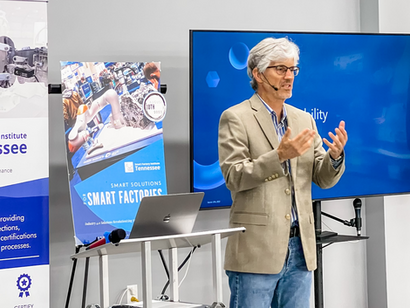
The Conference featured stakeholders from across the EV supply chain who discussed opportunities and challenges that lay ahead for manufacturers working to meet the growing demand for EV technology, charging infrastructure, batteries, and raw materials such as lithium-ion.
According to Denise Rice, President and CEO of Peak Performance (operators of the Smart Factory Institute), battery manufacturers have committed nearly $33 billion regionally to expand production, touching six states’ economies – Alabama, Georgia, Florida, North and South Carolina, and Tennessee. These investments are anticipated to create over 40,000 jobs.
In addition to battery manufacturers, lithium and other raw materials producers are also setting up shop in the South.
“The southern US region has captured over one-third of America's EV manufacturing investments and jobs, and regional EV sales in the South increased 50 percent over the past year” said Ben Stone, newly-appointed Director of Business Development for the Smart Factory Institute. “As a military veteran and long-time veteran of the motive power battery industry, I know how important it is for our domestic security and from a global competitiveness perspective to ensure manufacturers succeed in this transition to electrification. The Smart Factory Institute is helping ease this transition by providing manufacturers across the Southeast and the nation access to the latest Industry 4.0 technology.”
One of these producers, Piedmont Lithium, spoke at the Conference about how they are helping solve battery materials issues by being a pioneer in the virtually non-existent lithium-ion supply chain in North America.
“EV battery demand is expected to quadruple by 2025” said Malissa Gordon, Vice President for Government Affairs at Piedmont Lithium. “Piedmont Lithium strategically located our lithium hydroxide processing facility in Tennessee and an integrated mining and processing facility in North Carolina. Both of these are located within the ‘Battery Belt’ – where battery and automotive plants are being constructed by prospective customers due to positive business climates with cooperative local and state governments, as well as access to excellent infrastructure with convenient rail, road, and river transportation.”
Piedmont’s Tennessee Lithium Project, which earlier this month reported the results of its Definitive Feasibility Study, will be located at the North Etowah Industrial Park in McMinn County, Tennessee. Piedmont agreed to purchase the 279-acre site situated between Chattanooga and Knoxville in August 2022 and is expected to process 30,000 metric tons per year of lithium hydroxide.
Brett Smith, an automotive consultant and retired research fellow at the Center for Automotive Research (CAR) who has spent nearly 35 years analysing the industry, gave the keynote address at the Conference. He explained the four quadrants driving the future of the automotive industry – sustainability, automated and connected vehicles, digital transformation, and electrification.
“All four of these are remarkably expensive” said Smith. “A new car will typically have $10,000 worth of driver-assisted technologies, so it's not just a connected car but a connected industry.”
The Conference also featured two panel discussions. The first on the “EV Boom in the Southeast” was moderated by Tom Ballard, Chief Alliance Office at PYA and author of Teknovation.biz. Leaders from electric truck manufacturer, Xos Trucking, Drive Electric Tennessee, and the Tennessee Department of Economic and Community Development discussed advantages the Southeast has to draw in EV manufacturers over other regions, along with potential policy-related hurdles to EV adoption in the region, and workforce initiatives to help support EV job growth.
The second panel, moderated by Rick Youngblood, President of the Tennessee Automotive Manufacturers Association, examined EV charging infrastructure. Panelists from the Tennessee Valley Authority, Tennessee Department of Transportation, and Tennessee Department of Environment and Conservation analysed how recent Federal investments may help meet ambitious goals of reaching half of all new vehicles sold being EV or plug-in hybrids by 2030.
Breakout sessions included:
Coulometrics, energy storage and manufacturing consultant, on challenges facing automotive battery pack designers;
Senswork, automation machine manufacturer, on how AI-based inspection solutions can improve battery manufacturing production lines;
Igus, plastics manufacturer, on how to optimise battery manufacturing processes; and Dr. Nan Chen, Assistant Professor College of Engineering at Tennessee Tech University, on the fundamentals of charging technology.
Dr. Lyn Potter, Department Head, and Albert Curtis, Professor of Engineering and Information Technology at Chattanooga State Community College, also presented on how Chattanooga State and other Tennessee Board of Regents (TBR) institutions are helping meet EV workforce demand with a new curriculum for both new and incumbent automotive workers.
During lunch, conference attendees were able to see an electric vehicle and EV battery on display along with a demonstration on the process of how the battery functions. The vehicle and battery were provided by Chip and Dr. Dena Geppi from Hybrid and Electric Car Sales in Brentwood, TN.
The next Smart Factory Institute event, the Critical Networks in Manufacturing Forum, will help manufacturers learn how intelligent wireless infrastructure can accelerate operations and how private networks can positively impact productivity, costs, and lead times. Trever White, Group Manager, Digital Intelligent Manufacturing Engineering, Toyota North America will deliver the keynote address. The event will take place at the Smart Factory Institute on June 8, 2023 from 8:00am - 1:00pm ET. To register or become a sponsor, email Ben Stone at b.stone@peakperformanceinc.com.
For additional information:

